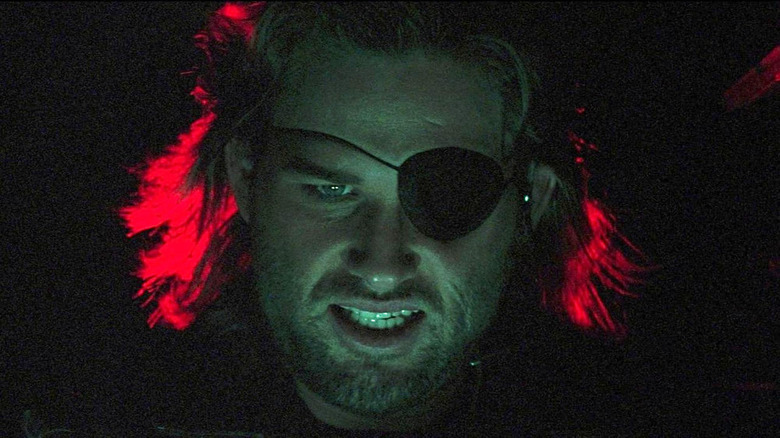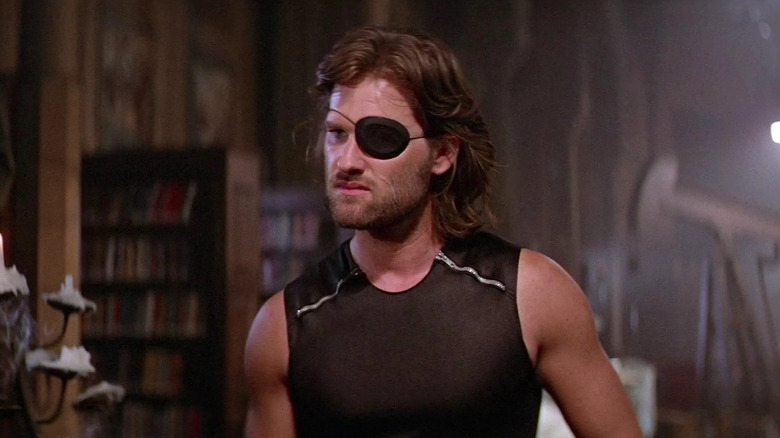Why Kurt Russell's Snake Plissken Is The Perfect Hero, According To John Carpenter
Snake Plissken, the taciturn antihero of John Carpenter's "Escape from New York," was clearly modeled after Clint Eastwood's character from the celebrated Man With No Name trilogy. They both have similarly gravely voices and seem to be resolutely amoral. If the parallels aren't clear enough, Carpenter cast Lee Van Cleef, Eastwood's frequent Name Trilogy co-star, in "Escape from New York." Unlike Eastwood's Man, however, Snake possesses a note of punk rock nihilism. He doesn't care about the world and doesn't give a damn if the U.S. President has been kidnapped or if some distant peace talks may fail. Snake has seen untold horrors from his one remaining eye, and he clearly lost his faith in humanity long ago.
Kurt Russell played Snake Plissken, and he has long felt that it's one of his best roles. Snake is memorable, tough, and kind of cartoony, a movie character for the ages. At the end of "Escape from New York," Snake deliberately sabotages a political summit because, well, he doesn't give a damn about a system that never gave a damn about him. Indeed, it was the system that transformed New York into a city-sized prison for ultra-criminals. The same is true in the 1996 sequel "Escape from L.A.," which predicted the rise of a Christo-fascist regime. At the end of "L.A.," Snake pretty much ushers in the end of the world, sickened by the dystopia around him.
In 1996, shortly before the release of "Escape from L.A.," Carpenter spoke about Snake with the Sci-Fi Entertainment Magazine put out by the Sci-Fi Channel (now called Syfy), and he felt that the character was pretty much the ideal hero. For Carpenter, Snake possessed perfect resolve and never wavered from his life's goal, which was to save his own ass. Not in a cowardly way; he would never sell someone out. But Snake definitely didn't care about anyone else.
Snake Plissken had a perfect sense of focus
For Carpenter, the best heroes have a sense of unwavering steely resolve. One can see this quality in just about every major action hero in modern blockbuster history. Heroes have a devotion to a cause and nothing will shake that. Some filmmakers like to give their heroes more recognizably human elements — like a note of tragedy, a fun sense of humor, or some self-doubt — but their morals and their devotion to their mission never wavers. Snake Plissken's morals never waver for a second in "Escape from New York." His morals only happen to be bleak and nihilistic. He may get frustrated at his desperate situation, and he may not always know what to do on a practical level, but he's never tempted to be anything other than bitter and devoted to himself. As Carpenter put it:
"What makes a hero is a singleness of purpose. [...] It's a very, very firm focus. That's what's always defined a hero in literature and in movies, and Snake has that. He's focusing on one thing: He's going to save his butt. He's a very bad, innocent man. Nothing can change him. He's incorruptible."
Snake may not always want to behave in a righteous fashion, but his moral simplicity means that he can never compromise. He recognizes corrupt systems when he sees them, hates cops, and only agrees to rescue the President under duress. He will never fold, never sell out, and never soften. In our bitterer moments, I think many filmgoers can relate to Snake's amorality.
In "Escape From New York," it's explained that Snake is a former Green Beret, who lost his eye — and his faith in humanity — during a bungled hostage situation during World War III. Snake might have been a brave and idealistic soldier once upon a time, but disappointment took hold of him eventually. Now, he trusts only one thing: himself. That's kind of perfect.

